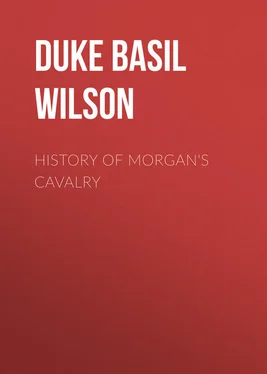Basil Duke - History of Morgan's Cavalry
Здесь есть возможность читать онлайн «Basil Duke - History of Morgan's Cavalry» — ознакомительный отрывок электронной книги совершенно бесплатно, а после прочтения отрывка купить полную версию. В некоторых случаях можно слушать аудио, скачать через торрент в формате fb2 и присутствует краткое содержание. Издательство: Иностранный паблик, Жанр: foreign_antique, foreign_prose, на английском языке. Описание произведения, (предисловие) а так же отзывы посетителей доступны на портале библиотеки ЛибКат.
- Название:History of Morgan's Cavalry
- Автор:
- Издательство:Иностранный паблик
- Жанр:
- Год:неизвестен
- ISBN:нет данных
- Рейтинг книги:3 / 5. Голосов: 1
-
Избранное:Добавить в избранное
- Отзывы:
-
Ваша оценка:
- 60
- 1
- 2
- 3
- 4
- 5
History of Morgan's Cavalry: краткое содержание, описание и аннотация
Предлагаем к чтению аннотацию, описание, краткое содержание или предисловие (зависит от того, что написал сам автор книги «History of Morgan's Cavalry»). Если вы не нашли необходимую информацию о книге — напишите в комментариях, мы постараемся отыскать её.
History of Morgan's Cavalry — читать онлайн ознакомительный отрывок
Ниже представлен текст книги, разбитый по страницам. Система сохранения места последней прочитанной страницы, позволяет с удобством читать онлайн бесплатно книгу «History of Morgan's Cavalry», без необходимости каждый раз заново искать на чём Вы остановились. Поставьте закладку, и сможете в любой момент перейти на страницу, на которой закончили чтение.
Интервал:
Закладка:
General Floyd soon found that he could (with no exertion) maintain perfect order, or rescue more than a fragment from the wreck, and he bent all his energies to the task of repressing serious disorders, preventing the worst outrages, and preserving all that was most absolutely required for the use of the army, and that it was practical to remove.
It was easy for officers who respectively saw and considered but one matter, to advise attention to that in particular, and to censure if their advice was not taken. But the very multiplicity of such counsellors, embarrassed rather than assisted, and showed the utter impossibility, in the brief time allowed, of attending to every thing. I saw a great deal of General Floyd, while he was commanding in Nashville, and I was remarkably impressed by him. I was required to report to him almost every hour in the twenty-four, and he was always surrounded by a crowd of applicants for all sorts of favors, and couriers bringing all sorts of news. It was impossible in the state of confusion which prevailed to prohibit or regulate this pressing and noisy attendance, or to judge, without examination, of what was important to be considered. Many matters which ordinarily a general officer would not permit himself to be troubled with, might need attention and action from him at such a time. Irascible and impetuous as General Floyd seemed to be by nature – his nerves unstrung, too, by the fatigues of so many busy days and sleepless nights – and galled as he must have been by the constant annoyances, he yet showed no sign of impatience. I saw him give way but once to anger, which was, then, provoked by the most stupid and insolent pertinacity. It was interesting to watch the struggle which would sometimes occur between his naturally violent temper and the restraint he imposed upon it. His eye would glow, his face and his lips turn pale, and his frame shake with passion; he would be silent for minutes, as if not daring to trust himself to speak, looking all the while upon the ground, and he would then address the man, whose brusqueness or obstinacy had provoked him, in the mildest tone and manner. He was evidently endowed with no common nerve, will, and judgment.
At last the evacuation was completed, the army was gotten clear of Nashville, the last straggler driven out, all the stores which could not be carried off, nor distributed to the citizens, burned, and the capitol of Tennessee (although we did not know it then) was abandoned finally to the enemy. Morgan's squadron was the last to leave, as it was required to remain in the extreme rear of the army and pick up all the stragglers that evaded the rear guards of the infantry. Our scouts left behind, when we, in our turn, departed, witnessed the arrival of the Federals and their occupation of the city.
The army was halted at Murfreesboro', thirty miles from Nashville, where it remained for nearly a week. Here it was joined by the remnant of Crittenden's forces. After a few days given to repose, reorganization and the re-establishment of discipline, General Johnson resumed his retreat. He concluded it with a battle in which he himself was the assailant, and which, but for his death, would have advanced our banners to the Ohio. It was fruitless of apparent and immediate results, but it checked for more than a year the career of Federal conquest, infused fresh courage into the Southern people, and gave them breathing time to rally for farther contest. His death upon the field prevented vast and triumphant results from following it then – the incompetency of his successors squandered glorious chances (months afterward) which this battle directly gave to the Confederacy. When the line of march was taken up, and the heads of the columns were still turned southward, the dissatisfaction of the troops broke out into fresh and frequent murmurs. Discipline, somewhat restored at Murfreesboro', had been too much relaxed by the scenes witnessed at Nashville, to impose much restraint upon them. Unjust as it was, officers and men concurred in laying the whole burden of blame upon General Johnson. Many a voice was then raised to denounce him, which has since been enthusiastic in his praise, and many joined in the clamor, then almost universal against him, who, a few weeks later, when he lay dead upon the field he had so gallantly fought, would have given their own lives to recall him.
Crossing the Tennessee river at Decatur, Alabama, and destroying the immense railroad bridge at that point, General Johnson pressed on down through the valley, through Courtland, Tuscumbia, and Iuca, to Corinth. This was for a short time, until he could concentrate for battle, the goal of his march. Here all the reinforcements at his command could reach him, coming from every direction. He only awaited their arrival to attack the enemy, which, flushed with the successes at Henry and Donelson, lay exposed to his blows, ignorant of his vicinity.
The force with which he crossed the Tennessee river was a little over twenty thousand men. It was composed of the troops which had held the lines in Kentucky – those which had been stationed at Bowlinggreen, all that was left of Crittenden's command, all that were left of the garrisons of Donelson and Henry. The garrisons of minor importance in Tennessee contributed, as the State was evacuated, to strengthen the army. He was very soon joined by the forces from Pensacola, about ten thousand strong, and a splendid body of men. They were superior in arms, equipment, instruction and dress, to all of the Western troops, and presented an imposing appearance and striking contrast to their weather-stained, dusty and travel-worn comrades. Nothing had ever occurred to them to impair their morale; they seemed animated by the stern spirit and discipline which characterized their commander, and a fit reserve with which to turn the tide of fortune. Beauregard brought with him some troops from New Orleans and other parts of Louisiana. General Polk came with the troops which had held Columbus. Several hurriedly raised and organized regiments came from the various States of the department. Price and Van Dorn, having between them fifteen thousand veterans, did not arrive in season to participate in the immediate movements which General Johnson had determined upon. A knowledge that the retreat had been brought to a close and that a battle was about to be fought in which we would attack, did more to inspirit the troops and restore to them soldierly feeling and bearing, than any efforts in behalf of discipline. The spirit of the men who had come from Florida and other points not surrendered to the enemy had a favorable influence upon the remainder, whose pride was aroused by the comparison and example. The sudden and seemingly magical change from despondency to highest hope, from a sullen indifference to duty to the most cheerful alacrity and perfect subordination, showed how wonderfully susceptible was the material which composed our army to the hopes inspired by a daring policy. The same men who had dragged themselves reluctantly along, as if careless of reputation and forgetful of the cause they had to fight for, were now full of zeal, energy and confidence. Those who had almost broken out into open mutiny, now rendered the promptest obedience to every order. The denunciations they had uttered against General Johnson, were silenced just so soon as they learned that he was about to lead them to instant battle, and his name was never mentioned except with becoming respect, and often with praise. In short, every trace of demoralization disappeared – courage, pride and efficiency, returned; and, from a condition not much better than that of an armed mob, the army became again disciplined, valiant and reliable. While the masterly ability and soldierly vigor and decision of General Johnson must excite the profoundest admiration, those who remember him may be pardoned for dwelling quite as much upon the grandeur, the loftiness, the heroism of his character. In this we may look in vain for his peer, except to the great Virginian, his immortal comrade, the man whom every former Southern soldier must feel it is his religious duty to venerate. Through all that period of sickening doubt, amidst all the reverses, in the wide spread demoralization which attacked all ranks, General Johnson towered like a being superior to the fears and fate of other men. The bitter censure which was cast at him from all sides, could move him to nothing weak or unworthy of his high nature. He gave way to no anger or scorn – he deigned no argument or apology. When the President, his devoted friend and warm admirer, urged him to supersede the officers who had suffered defeat, he answered that they were brave, although inexperienced men, and that he preferred to trust them until he could find better.
Читать дальшеИнтервал:
Закладка:
Похожие книги на «History of Morgan's Cavalry»
Представляем Вашему вниманию похожие книги на «History of Morgan's Cavalry» списком для выбора. Мы отобрали схожую по названию и смыслу литературу в надежде предоставить читателям больше вариантов отыскать новые, интересные, ещё непрочитанные произведения.
Обсуждение, отзывы о книге «History of Morgan's Cavalry» и просто собственные мнения читателей. Оставьте ваши комментарии, напишите, что Вы думаете о произведении, его смысле или главных героях. Укажите что конкретно понравилось, а что нет, и почему Вы так считаете.












